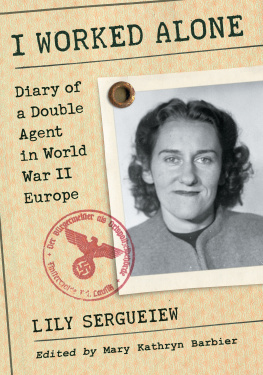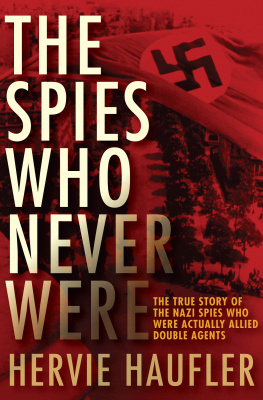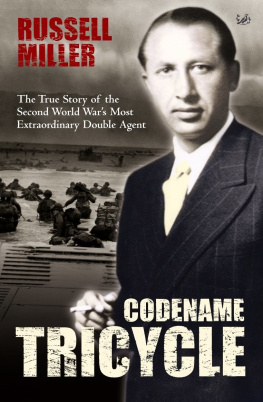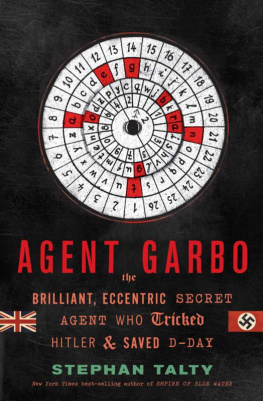
I Worked Alone
Diary of a Double Agent in World War II Europe
Lily Sergueiew
Edited by Mary Kathryn Barbier

McFarland & Company, Inc., Publishers
Jefferson, North Carolina
LIBRARY OF CONGRESS CATALOGUING DATA ARE AVAILABLE
BRITISH LIBRARY CATALOGUING DATA ARE AVAILABLE
e-ISBN: 978-1-4766-1717-6
2014 Michele Jimeson and Mary Kathryn Barbier. All rights reserved
No part of this book may be reproduced or transmitted in any form or by any means, electronic or mechanical, including photocopying or recording, or by any information storage and retrieval system, without permission in writing from the publisher.
Cover photograph: Nathalie Sergueiew, alias Lily, in 1944 (Security Service, National Archives UK)
McFarland & Company, Inc., Publishers
Box 611, Jefferson, North Carolina 28640
www.mcfarlandpub.com
To the memories
of Nathalie Lily Sergueiew
and her husband
Colonel John Barton Collings
and to her nieces,
Corinne Sauty de Chalon Liard
and Irne Sauty de Chalon Schaeffer
Editors Acknowledgments
I first learned about Nathalie Lily Sergueiew when I was doing my dissertation research. She was one of several double agents who contributed to Operation Fortitude, which provided cover for the Normandy invasion that commenced on 6 June 1944. Lilys experience is unique because most double agents were men. When France fell to Germany in June 1940, Lily became determined to do her part to boot the German occupiers from French soil. She decided that the best way to do this was to become a double agentto offer to spy for the Germans when in fact she intended to work against them.
There are several people who deserve my thanks because, without them, this book would never have seen the light of day. First, I would like to thank Colonel John Barton Collings, who loved Lily deeply and devotedly and held on to her books and this manuscript after she died. Unfortunately, he passed away in November 2013 before I was able to finish this project. I would like to thank his daughter Michele Collings Jimeson, who grew up hearing about the love of her fathers lifeLily. Michele contacted me when she discovered Lilys things in her fathers attic. She graciously allowed me access to them and purchased a copier and helped me photocopy Lilys memoir. In addition, Lilys niece Corinne Liard gave me access to the novel, Jean, that Lily wrote and refers to in her memoir.
I would like to thank Dr. Gary Myers (my former dean at Mississippi State University) and Dr. Gregory Dunaway (my current dean at Mississippi State), who awarded me HARP grants that helped fund my research trips for this project. Thanks also go to Dr. Alan Marcus, my department head, who has supported both my research and my presentation of it at academic meetings, and to my department colleagues and friends at Mississippi State, who have patiently listened to me talk about Lily and her experience.
I would also like to acknowledge the support of my family who has been subjected to repeated anecdotes about Lily and her adventures. Special thanks go to Dr. Dennis Showalter of Colorado College, my mentor and friend, who has offered me encouragement and sage advice every step of the way.
Special thanks also to Dr. David I. Hall, JSCSC, Kings College London, for his support and encouragement as I worked on this exciting project.
Editors Preface
Nathalie Lily Sergueiewaka Treasure, Solange, Trampwas a travel writer, an adventurer, a romantic, a patriot, and, for a brief period during the Second World War, a double agent. She was a strong, confident woman who lived during a time when men were dominant in society. Although the majority of spies and double agents were men, some were women. Recently, scholars have called these women heroines. At the time, however, society did not always treat them kindly. After all, only a certain type of woman, like Mata Hari, who used her feminine wiles to hoodwink men into revealing state secrets, would become a spy. Obviously, female spies were immoral, sexual sirens who set out to entrap unsuspecting men. They slept their way to information. Men who employed the same tactics were suave, debonair, and admired.
Not all women conformed to the stereotype. Some, like Sergueiew, were patriotic and did not think twice about engaging in a profession that would allow them to contribute to the defeat of the enemy. Unfortunately, she was more focused on kicking the Germans out of her beloved France than in getting along with her British employers, which brought her into conflict with the cold British men and women with whom she worked. The two sidesSergueiew and the Britishhad different motivations and different perspectives. Their failure to understand and completely trust each other led to the dissolution of their relationship within a short period of timeseven months. Despite the unceremonious severing of their relationship, Sergueiew made a major contribution to the Allied war effort.
A writer before the war, Sergueiew continued to write during and after. She broke the rules and kept diaries that chronicled her experiences from the end of 1940 when she decided to become a double agent to the frustrating delays that she experienced along the way as she tried to bring her plan to fruition, to her work with the British, and finally to her return to France as a member of the M.M.L.A., French army. Along the way, she encountered incompetence, received training in encoding and decoding, invisible writing, and wireless transmission, had serious health problems, and suffered a loss, the result of a broken promise that tainted her relationship with her British employers and fostered the distrust that both sides experienced.
After the war, Sergueiew decided to write a memoir, originally entitled I Worked Alone: Diary of a Double Agent. In 1966, Sergueiews mother had part of the diary published in France with the title Seule Face lAbwehr. The English version, Secret Service Rendered, was published two years later. In January 2010, I acquired a copy of Sergueiews translated, unedited memoir. What follows is Lilys own words. I have provided clarifications for the reader when necessary, but I want to let Lily speak for herself. Therefore, I have made spelling and grammatical corrections only when necessary to help the flow of the narrative.
Authors Original Preface
To gather this material scattered in notebooks has made me live again all these months of disappointment when, very rapidly, I lost, one by one, the illusions which, for three years, had given me force and faith to bring my work to an end. For those who will read what follows, it will be but a book, pages, words. For me, it has been something different. I had to live through it. When I doubted, there was no one to give me confidence; no one to assure me it was worthwhile and that I was right. It was as though I was walking in a black tunnel. But what does it matter now; its finished. Maybe Im wrong to try to make a book out of it.
It isnt facts I have tried to relate. I have rather attempted to show what one feels, what one experiences, what one thinks when doing what I did. A writer can invent facts a hundred times more thrilling, he can show sharp emotions, but he doesnt know what it really is. I dont wish to make a detective story out of it. I could have exaggerated situations; it wouldnt be difficult. But I want it to be a document. There will be people whom it will interest; it will give them an idea of different methods of espionage, the working of certain Secret Services, personal reactions and the advantages one can draw out of certain situations. It will interest experts. As to the rest of the public, I didnt have them in mind when writing.
Next page









